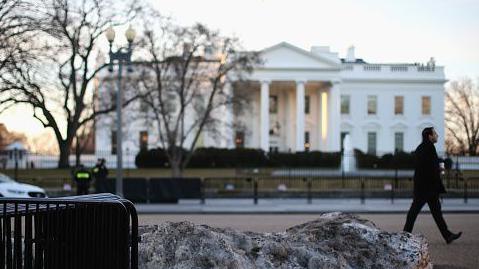Man gets eight years for ramming truck into White House barriers

- Published
A Missouri man who crashed a rental truck into the security barriers near the White House in 2023 has been sentenced to eight years in federal prison.
Sai Varshith Kandula, then 19, stated that his intention was to overthrow the government and replace it with a "Nazi style dictatorship", prosecutors said.
He also told investigators he would have arranged for the killing of the president and others if necessary, according to the Department of Justice.
Kandula pleaded guilty to one count of wilful injury or federal property damage last year.
The teenager flew from St Louis, Missouri, to Washington, DC where he rented a truck in May 2023, according to court documents. He then drove onto the sidewalk and crashed the vehicle into the barriers protecting the White House.
Kandula then exited the truck and went to the back of the vehicle from where he pulled out a flag and a red and white banner with a Nazi Swastika before Secret Service officers jumped in. There were no weapons or explosives found in the vehicle, officials said.
The incident - which happened just before 22:00 local time (02:00 GMT) - triggered evacuations of local hotels including the historic Hay-Adams.
Video of the crash taken by witnesses and posted to social media show the truck stopped on a sidewalk before it accelerated and collided with a set of security posts.
He attempted to gain access to the White House to seize political power, according to the plea agreement. Prosecutors said he intended to replace the US government with a dictatorship and put himself in charge of the country.
Kandula planned the attack for several weeks, making prior attempts to access vehicles or armed security guards before the 2023 incident.
The Justice Department says his actions were "calculated to influence or affect the conduct of government by intimidation or coercion".
Kandula is an Indian national who was a permanent US resident at the time of the incident.
The judge also ordered he serve three years of supervised release.